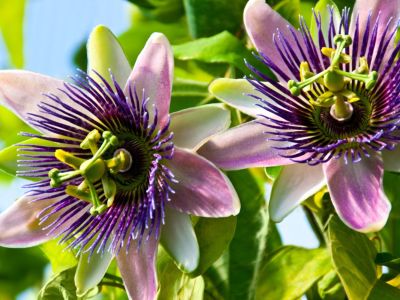Passionflower Vine Problems
All passion flowers are frost tender. They must be protected in the winter. They are also susceptible to soil-borne diseases, fungi, viruses, bacteria, and nematodes. One of the issues affecting passionflower vines is that the sweet-tasting, purple fruited subspecies are highly susceptible to the root-knot nematode. Root-knot nematode causes a severe thickening of the roots and even death. Fortunately, the more acidic, yellow fruited subspecies are resistant to nematodes and can be used for rootstock and disease-resistant hybridization. There are many passionflower diseases. One of the biggest problems with passion flowers is the fungus that causes fusarium wilt. Fusarium wilt is a soil-borne disease that can be deadly. The first signs are yellowing leaves followed by dying and dropping leaves. After that, the branches and trunks split and come away from the bark. Finally, the roots discolor and die. Again, growing passion vine on the yellow fruited subspecies rootstock helps control this problem. Viruses, like cucumber mosaic, can affect passionflower vines. It is commonly transmitted through cucumber beetles and aphids. The virus can also spread between plants or infected seed. Plants that are affected show a mosaic-type mottling in the leaves along with stunted growth and leaf distortion. There is no cure other than prevention, so infected plants should be removed. Pests of passion vine also include the highly damaging bacterial spot caused by the bacteria Xanthomonas. It is very difficult to control and causes a lot of damage to commercial crops. The disease begins with small, round spots on the leaves. These spots can grow larger, kill the leaves, reduce photosynthesis, enter the vascular system, reduce plant vigor, damage fruit, and even decimate the whole plant. There are no chemicals on the market that will control this disease. Some species have shown limited resistance and there is hope that a resistant variety that also produces good fruit can be developed. Passionflower vine is a highly attractive and, in some cases, edible plant. It is important for gardeners to be prepared for passionflower vine problems though. Buy only disease-resistant species. Plant them in the right spot with good quality, fast-draining soil in full sun with humid air and plenty of water. This should help these plants resist most diseases and pests of the passion vine.
